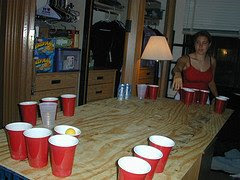What are Technological Fixes?
Technological fixes are when technology is used to to fix a problem or the negative consequences of a problem. For example, putting fluoride in drinking water as a way to stop tooth decay. Below are some examples of technological fixes that have been developed in order to reduce binge drinking and/or its effects. As you read through them, think about how successful they might be at reducing binge drinking (specifically on college campuses).
Breathalyzers and ID scanners
In an article that we found on the George Washington student newspaper (GW Hatchet) site, the school decided to use breathalyzers and ID scanners as an "appropriate" measure to ensure the safety of students, according to Brian Hamluk, director of the Center for Alcohol and other Drug Education. However, the school has ensured that Student Judicial Services will not use the results of breathalyzer tests as a way of taking disciplinary action against students suspected of underage drinking. According to the article, the breathalyzers will not be used as a way of catching or stopping students, but will be used just as a way of determining the students intoxication level and whether or not the student needs medical attention.
iBreath - an attachment for your iPod
Another interesting technological fix that we found is the iBreath.
The product turns a person's iPod into an alcohol breathalyzer. The accessory costs $79 and plugs into the base of the iPod. The person using the iBreath simply exhales into the device and the internal sensor measures the blood-alchohol content. It displays the results on an LED screen within two seconds. If there is a reading of .08 or above, the device sets off an alarm.
Educational CD-ROM
Developed by a health professor at the University of Illinois, Alcohol 101 is a new CD-ROM designed to combat binge drinking. The CD-ROM functions as a digital orientation for college freshman on "smart partying."
Pill that stops binge drinking
According to recent research, there is a new pill that could stop binge drinking habits in just a matter of days.
The pill is called Naltrexone and has been shown to cut in half the amount that people drink and cut the number of heavy drinking sessions by 70 per cent after 12 weeks. It is thought to work by altering brain chemicals in order to reduce the craving for alcohol and making users feel they have drunk enough.
The Question:
The question is, do any of the technological fixes actually work? Would you feel OK with your school administering breathalyzers if you are even suspected of possibly drinking too much? Do you think taking a pill would help solve the problem of binge drinking?
Subscribe to:
Post Comments (Atom)

No comments:
Post a Comment